Here we are again at the end of another year. During 2024, ORCA Marine Mammal Surveyors conducted an astonishing 54,365 kilometres of effort across ferry surveys and Saga cruises, recording 11,230 individual animals in 2,005 encounters from 31 marine species.
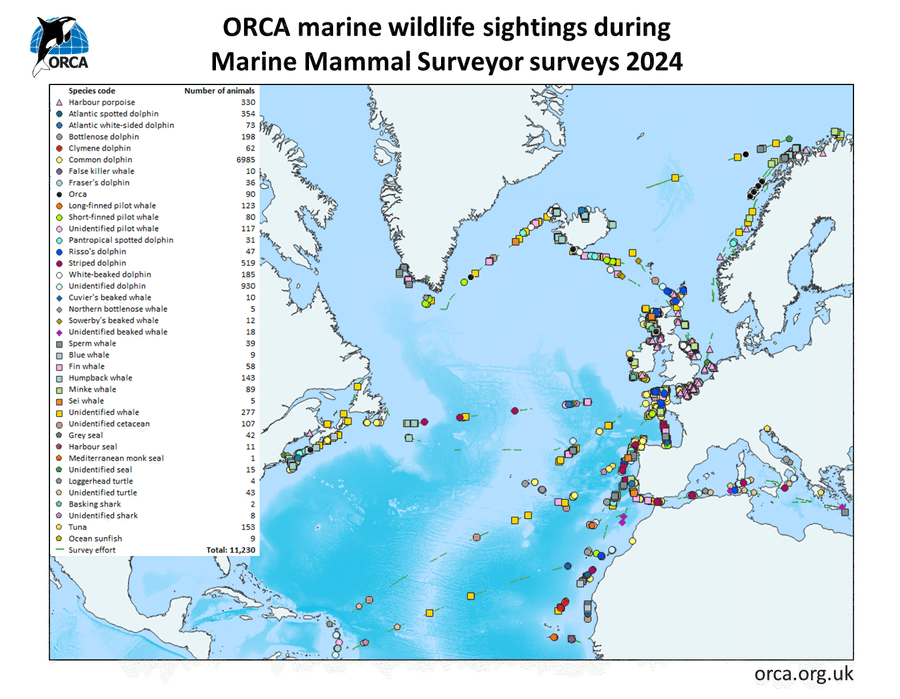
Ferry surveys
This year's surveys were carried out on a total of 14 different ferry routes around the UK, crossing five different sea regions: English Channel, Celtic Sea, Minches and West Scotland, North Sea and the Bay of Biscay. Survey teams of three or four trained Marine Mammal Surveyors conducted a total of 111 surveys, 13 more than in 2023. The first survey took place on the Plymouth-Santander route on the 24th March 2024, and the final survey took place on the 8th November 2024, on the Newhaven-Dieppe route.
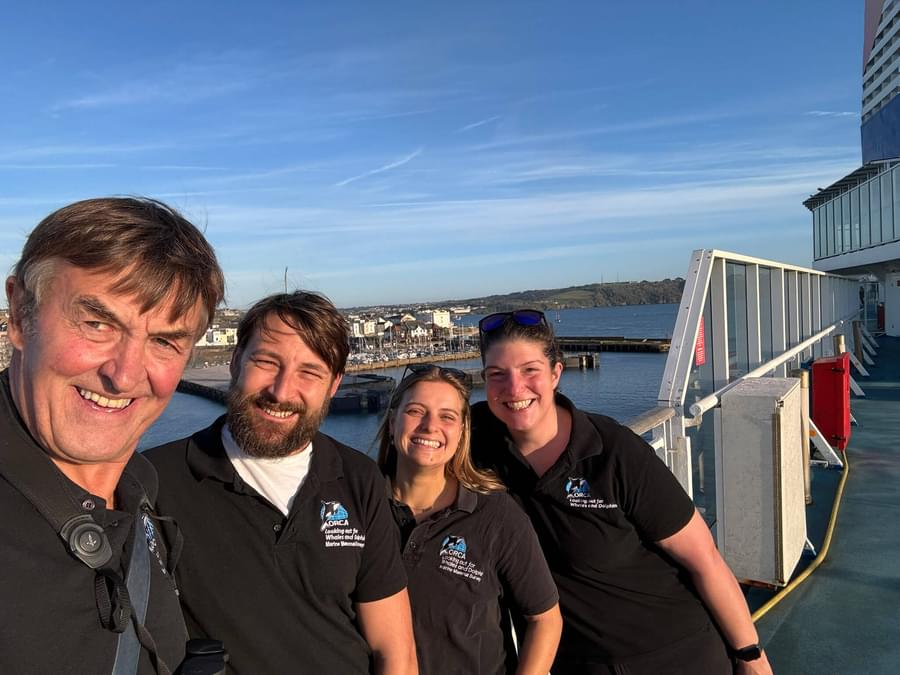
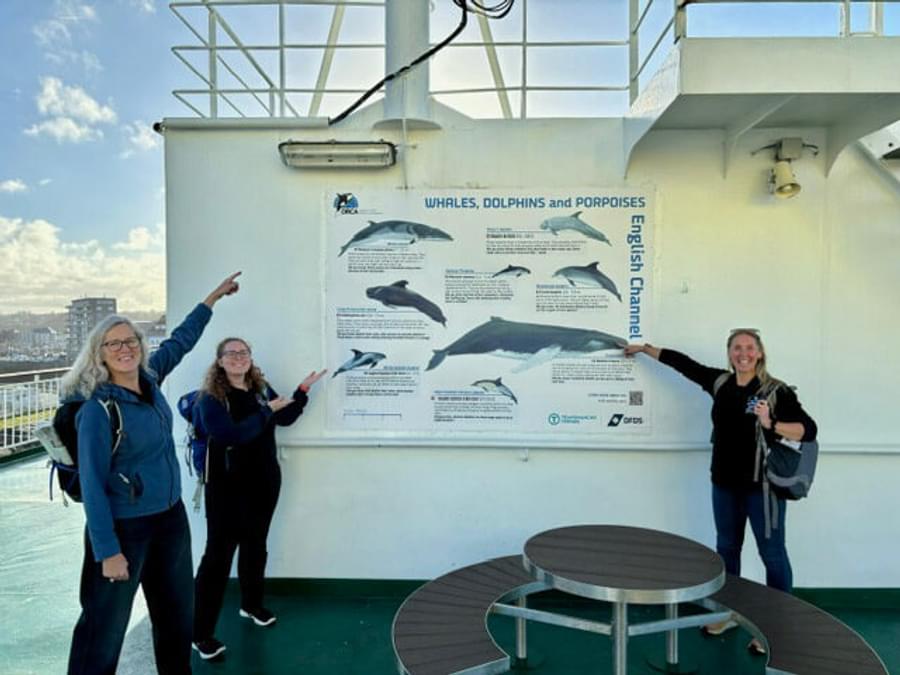
The Isles of Scilly route from Penzance-St Mary’s had the highest number of surveys conducted throughout the season, with a total of 15 surveys. This survey route also had the highest diversity of species of any UK ferry route - in terms of the number of different species seen and the total number of individual animals seen. There were 347 individual animals recorded from seven different marine species, including whales, dolphins, porpoises and seals. The Plymouth-Santander route remains the most diverse route overall however with 2,884 individuals from 11 species recorded across the season.
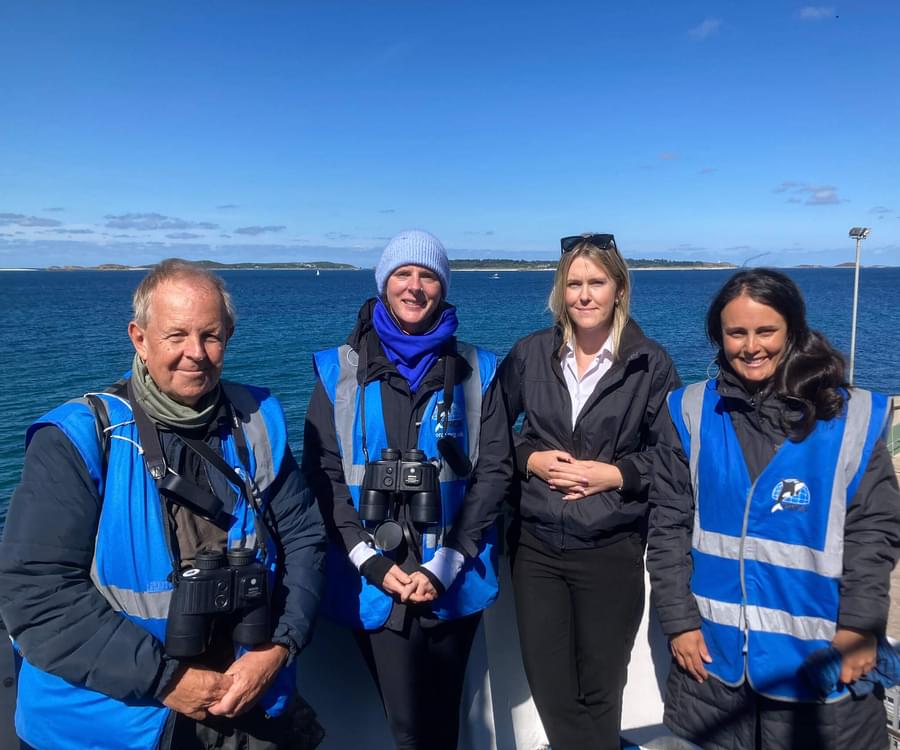
In total, 25,460 km of survey effort was conducted by ORCA Marine Mammal Surveyor survey teams on board ferries in 2024, yielding 928 sightings of 4,876 individual animals from 18 species. Once again, the most commonly recorded species was the common dolphin, with 3,709 individual animals seen. The Western English Channel, Celtic Sea and Bay of Biscay continued to be a stronghold of sightings of common dolphins in 2024, but there was also an increase further east in the English Channel this year.
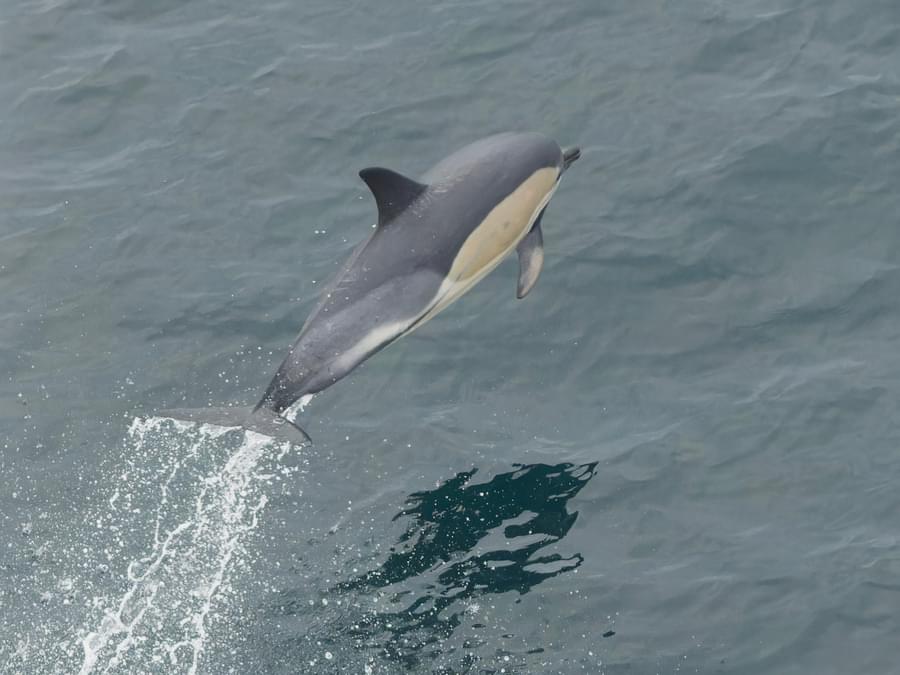
Other highlights on ferry surveys this year included several sightings of humpback whales on the Hebrides routes and record sightings on the English Channel routes with the Newhaven-Dieppe, Portsmouth-Caen and Poole-Cherbourg routes seeing especially productive years with sightings of harbour porpoises, bottlenose and common dolphins, and tuna recorded.
Saga cruises
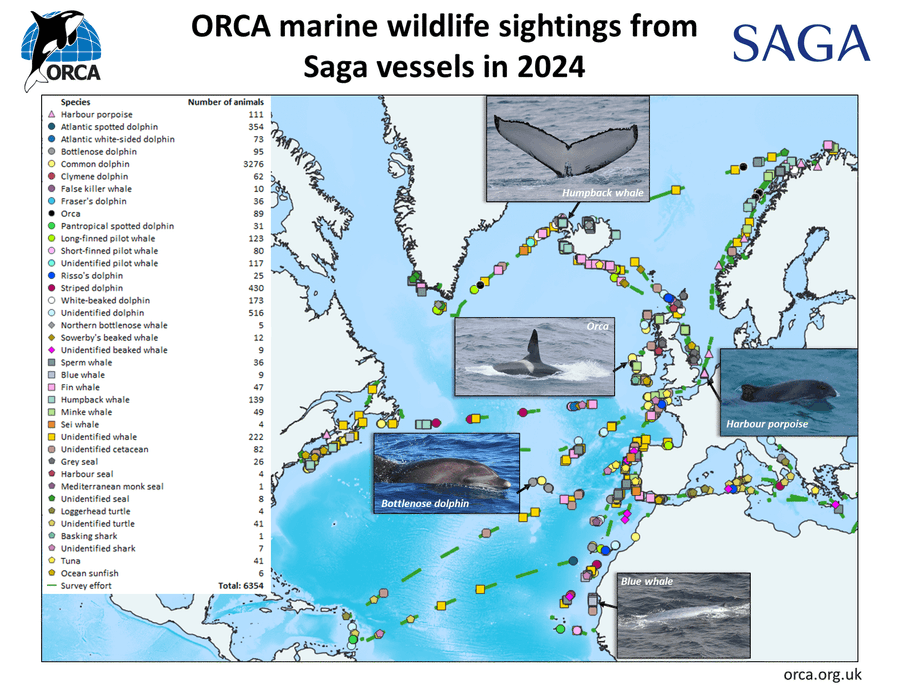
Teams of Marine Mammal Surveyors were offered places on board the Saga ships Spirit of Discovery and the Spirit of Adventure again this year. Teams of four Marine Mammal Surveyors were invited on board 12 itineraries, collecting vital data on the cetaceans seen but also enhancing the guest experience through lectures, wildlife watches, workshops and generally being on hand to talk about any wildlife seen.
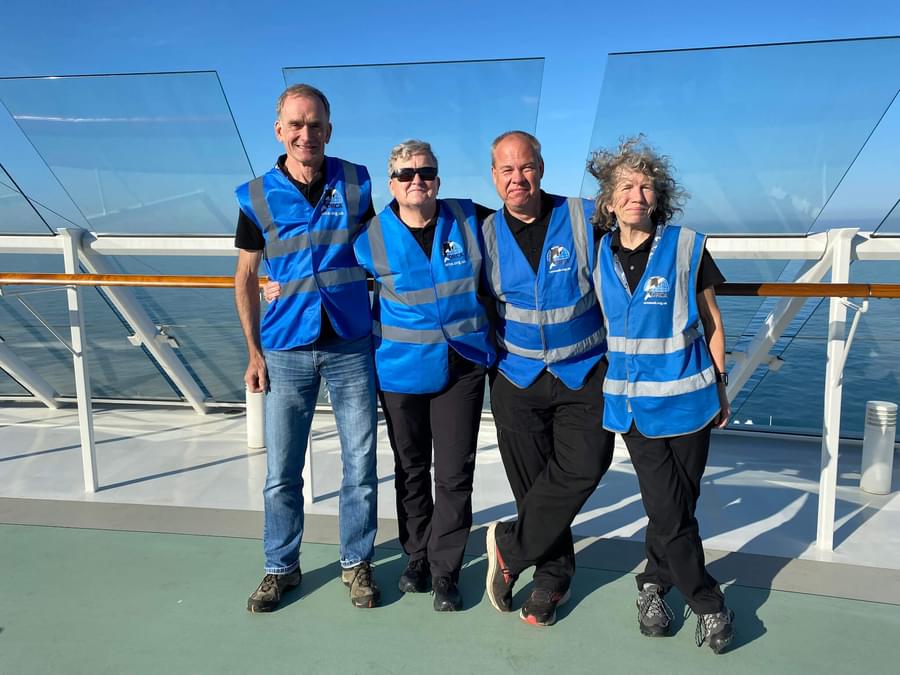
Marine Mammal Surveyor teams spent a total of 243 nights at sea on Saga cruise ships, travelling to the Mediterranean, Caribbean, Africa, Norway, USA, Canada, Iceland, Canaries and Greenland. A total of 30,400 km of survey effort was conducted, with 1,077 sightings of 6,354 individual animals from 30 species. Much of this data was collected in data deficient offshore areas which highlights the conservation value of these cruises.
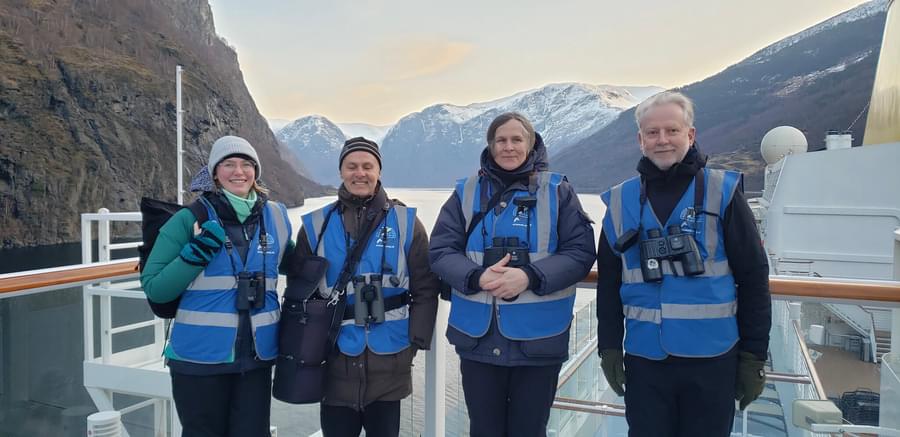
Saga cruise survey highlights in 2024 included the first record of a Mediterranean monk seal in ORCA’s dataset in Madeira. Monk seals as a group are the only tropical phocid (true seal) and unfortunately both the remaining species, the other being the Hawaiian monk seal, are endangered. One estimate suggests that only 700 Mediterranean monk seals remain.
Additionally, the iconic orca John Coe was recorded west of Ireland on the May West Coast Explorer cruise. John Coe and Aquarius are the last two members of the resident British population of this species who were heavily affected by pollutants, impacting their ability to reproduce and impairing their immune systems.
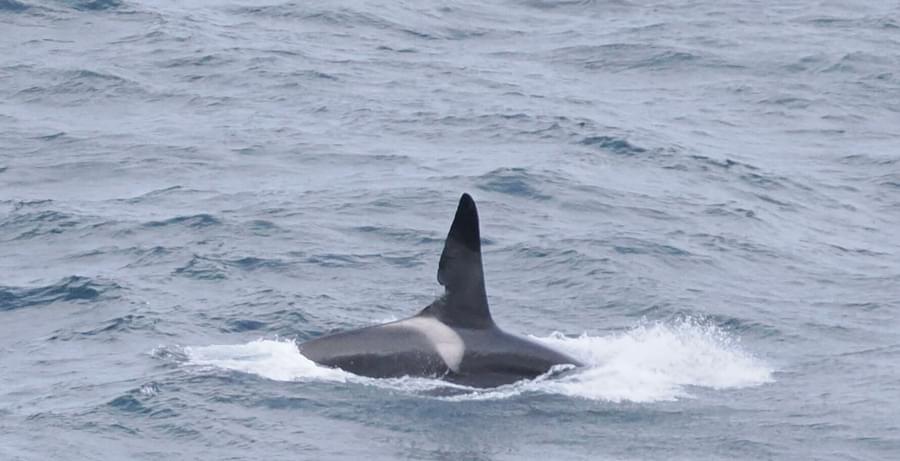
Marine Mammal Surveyors on the Africa’s Atlantic Coast cruise in February 2024 were lucky enough to spot blue whales just west of North Africa - this productive upwelling region supports high biomass and densities of low trophic level prey that blue whales feed on. Their whereabouts at lower latitudes during the winter months in the Atlantic Ocean are not very well understood so every sighting tells us something about what they might be up to during this time.
This year also saw the inclusion of bridge based distance sampling surveys as part of the Saga survey team’s role on board. This high level data collection was conducted on three itineraries on both the Spirit of Discovery and Spirit of Adventure, with data collection targeted to Important Marine Mammal Areas (IMMAs), and high risk vessel strike areas during the trips with a view to monitoring changes and informing management in these areas going forward.
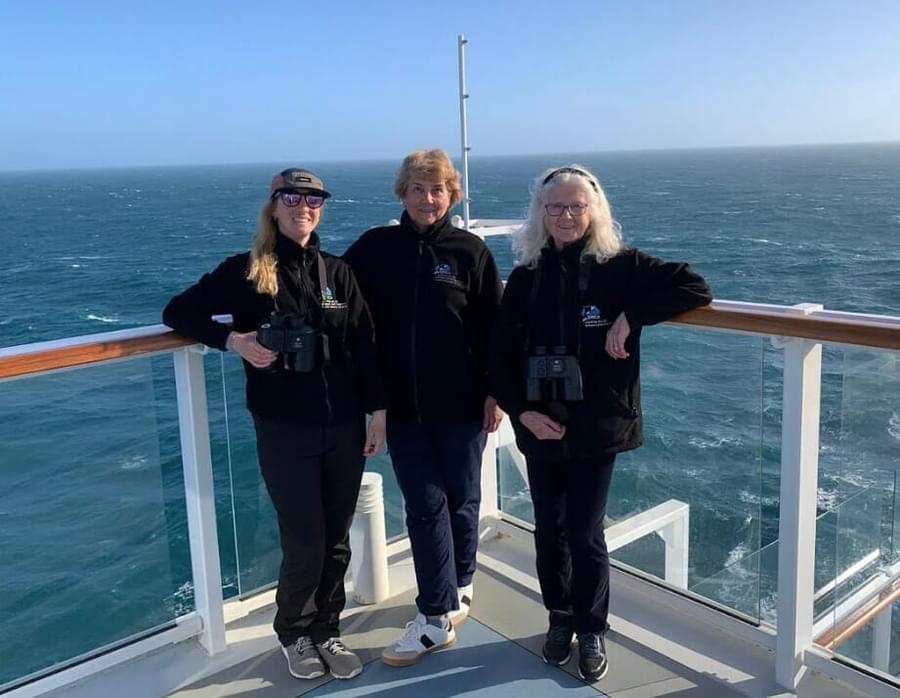
Southern Ocean Distance Sampling
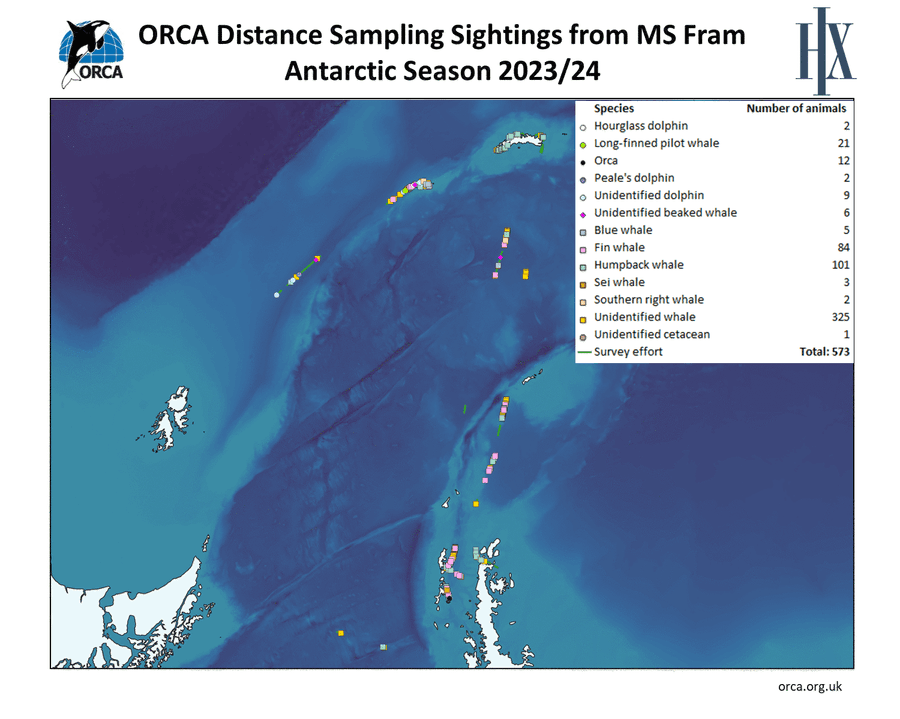
ORCA are leading a project in collaboration with the British Antarctic Survey, HX Expeditions, the International Association of Antarctic Tour Operators (IAATO) and the Government of South Georgia and the South Sandwich Islands to better understand the abundance and distribution of recovering whale populations in the Southern Ocean (with a particular focus on South Georgia and the Antarctic Peninsula). As experts in distance sampling, ORCA first devised and conducted a bespoke research project for the 2022/23 Antarctic season on board HX's Fram. This important research was continued the following year, and is now being conducted for a third year during the 2024/25 Antarctic season.
By identifying high density areas, ORCA hopes to enable mitigation measures to be implemented to protect these incredible animals in an area where shipping traffic is increasing. Data collected during the first and second years of the project has already been used to safeguard whales in these areas, contributing to seasonal protected areas for large whales around South Georgia and the Antarctic Peninsula – conservation in action! During the 2023/2024 Antarctic Season, 69 hours and 37 minutes of surveying was conducted from the bridge of HX Expedition’s MS Fram by Marine Mammal Surveyor Research Scientists, covering 1,652 km and recording 315 sightings of 573 individual animals, from nine different cetacean species.
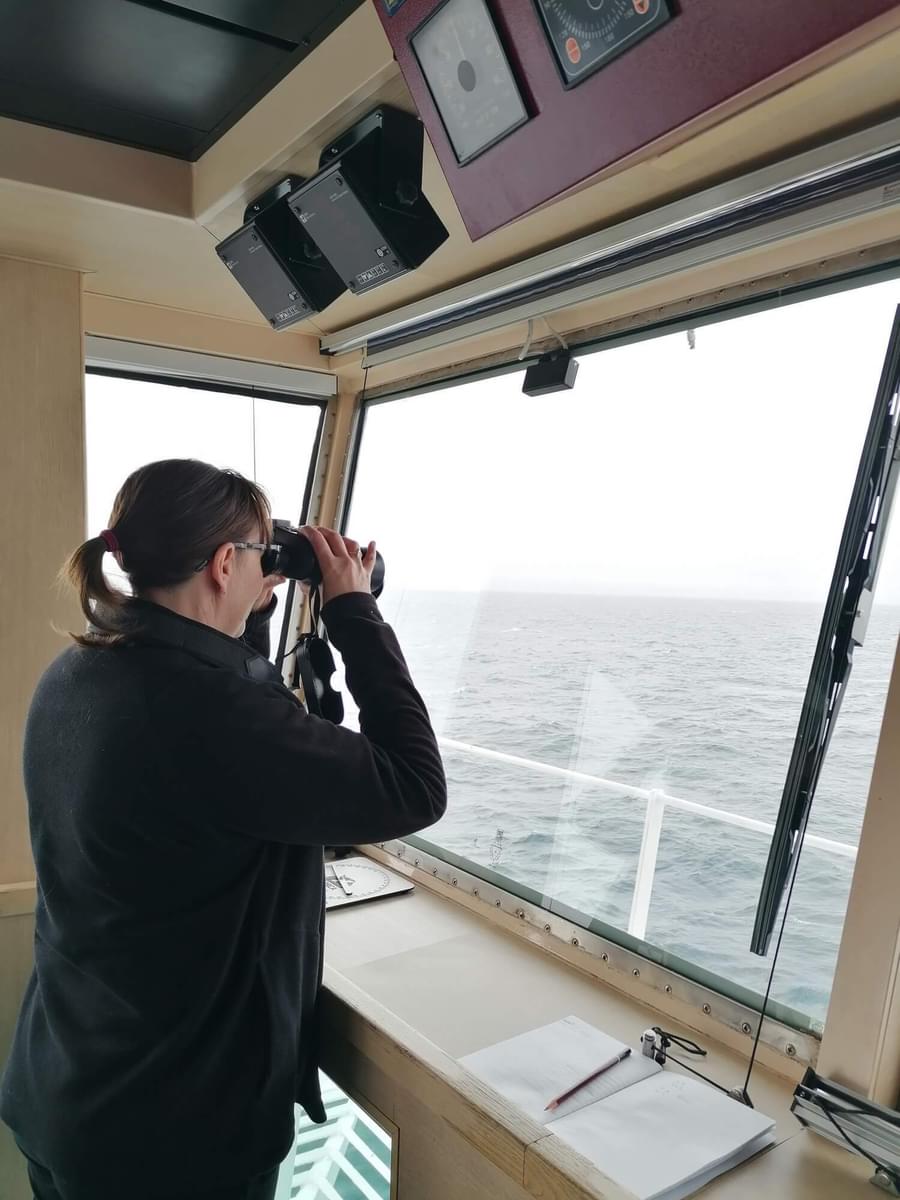
Survey highlights included a blue whale mother and calf recorded near Shag Rocks and several pods of strap-toothed beaked whales seen in quick succession over the oceanic trenches between the Falkland Islands and South Georgia. More blue whales were recorded during this research season than previous ones. It is estimated that whalers hunted 99% of the blue whale population in the region, but recent research suggests that blue whales are rediscovering South Georgia and it is expected that blue whale numbers will continue to increase year on year.
Sea Safaris
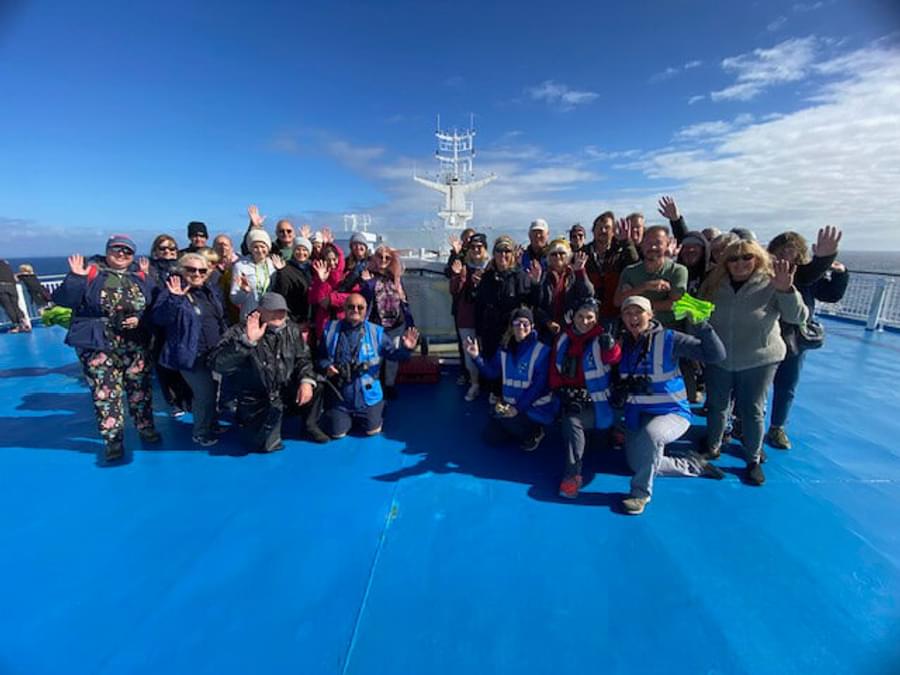
From June to September 2024 ORCA Wildlife Guides were on board the Brittany Ferries Pont-Aven for five return sailings from Plymouth to Santander, showing over 360 Sea Safari guests the incredible wildlife of the Bay of Biscay. The Bay of Biscay is a world hotspot for marine wildlife, with the chance to see over one-third of the world’s whale and dolphin species. ORCA has been surveying for whales and dolphins in the area for decades, and the ORCA Wildlife Guides on board this year's Sea Safaris couldn’t wait to get out to sea to share their knowledge, and help guests spot and identify the wildlife they saw.
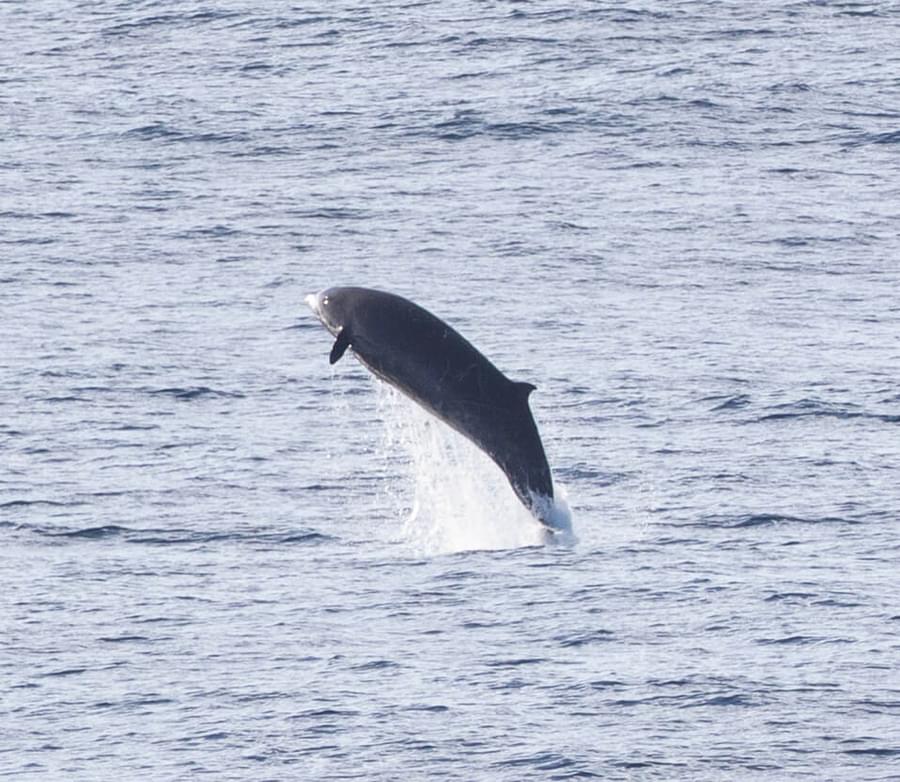
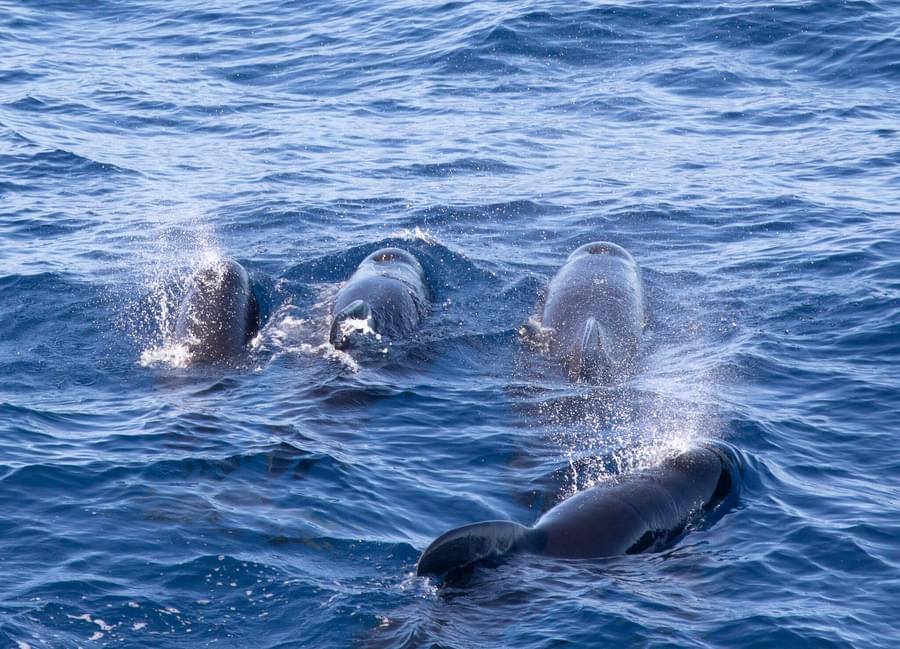
Ten different species of whale, dolphin and porpoise were recorded during this year’s Sea Safaris, with common dolphins being the most frequently sighted species. A total of 1,630 individual animals were seen during the five trips.
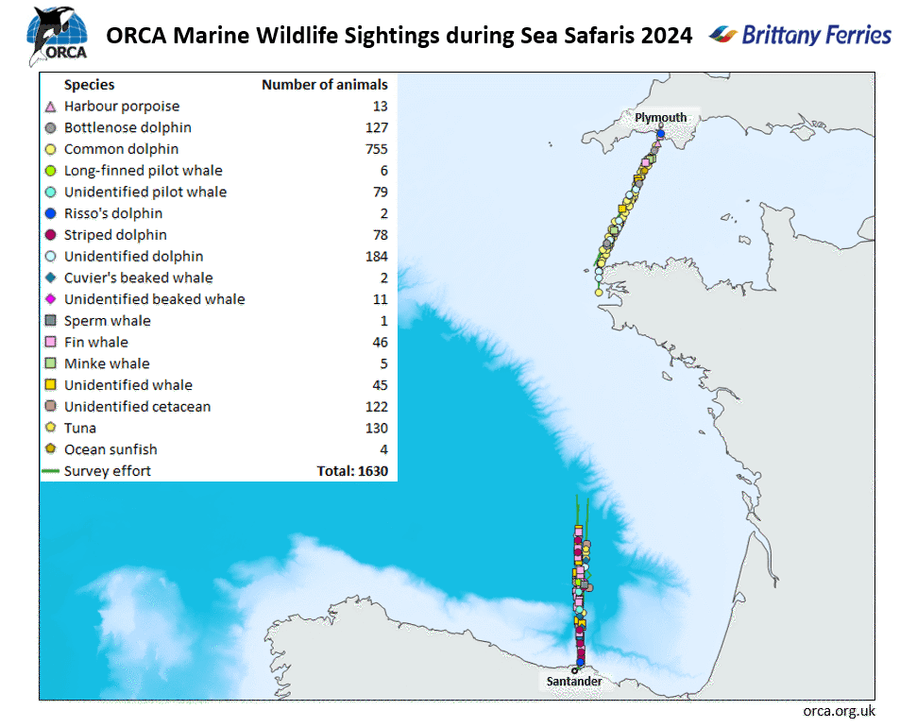
Team Leaders
None of our surveys could go ahead without our incredible Team Leaders who help to ensure the high quality of our data and pass on their knowledge to newer surveyors. There were 45 Team Leaders carrying out ORCA surveys this season, with eight of those being signed off as new Team Leaders in 2024.
Our brand new Team Leader e-Learning course has been developed this year and will be ready to start enrolling our dedicated Team Leaders and Trainee Team Leaders in the New Year. If you are interested in becoming an ORCA Team Leader and think you have what it takes, get in touch!
We hope you have enjoyed the 2024 survey season and thank you as always for all of your support. Number crunching here at ORCA HQ has already begun, but in order to ensure all of your hard collected data is included in our 2025 State of Cetaceans report, please make sure that any app data you have collected this year has been submitted to us by 3rd January 2025. If you run into any issues uploading your data, please contact [email protected] and we will do our best to assist you.
Have a fantastic end of the year and here is to another great survey season in 2025!
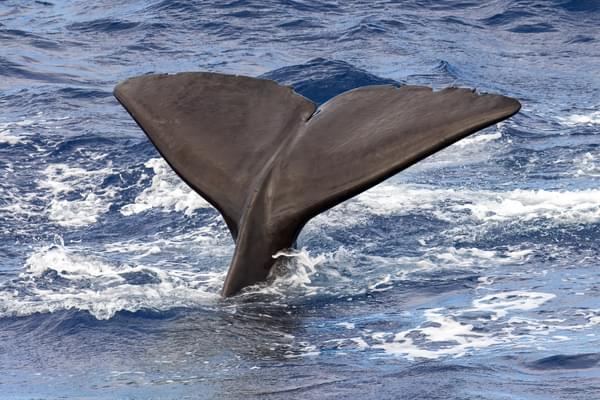
The only way we can protect whales and dolphins is by understanding their distribution, and so monitoring is vital for effective conservation. Donate today to help ORCA continue to identify and study important whale hotspots around the world by visiting www.orca.org.uk/donate

